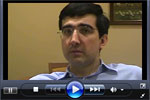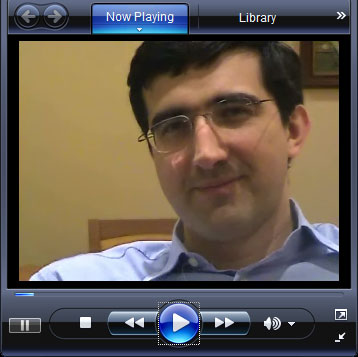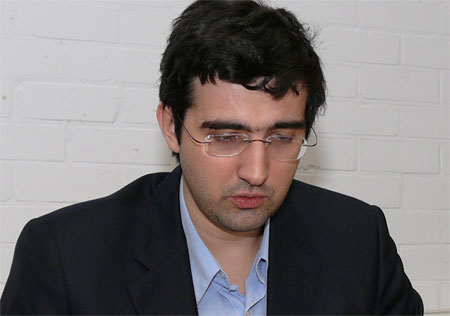


The following interview with World Champion Vladimir Kramnik was conducted during the Miskolc rapid chess match against Peter Leko in April this year. We bring you the entire interview in multiple segments, with a comprehensive transcription of each. The video is available in two different compressions, both with optimal sound and very little image quality. Depending on your Internet connection you can use either of the links given below the screen captures.

Video Kramnik-Miskolc06 –
High speed connection
– Lower speed
connection
Frederic Friedel: You have agreed to talk about cheating in chess. Did you cheat in Elista?
Vladimir Kramnik: No, I never cheated in my life. Not only in chess, but especially in chess I never played any pre-arranged tournaments or anything.
You have never agreed to a quick draw…?
It happened, but that is all. That is part of chess, a part of chess culture, and happens from time to time. But very rarely. Most of the quick draws which I made just happened. But it is not common. I can’t remember the last time I made a short draw without really playing. But I definitely did not participate in winning or losing games, buying games or selling games, and of course no cheating during a game. That is quite obvious.
But if you are talking about the cheating problem first of all I would like to start by saying we shouldn’t become too hysterical about it. I don’t like the trend. The situation is developing a bit strangely, because a lot of mass media people are talking about it now, but nobody is doing anything. This I find strange. I would prefer not to talk too much, because everything has been said, everything is clear. It is absolutely obvious that theoretically nowadays it is becoming easier and easier to do this, in all tournaments where you do not have anti-computer controls. There is nothing else to add to it. So now we have to get to the practical point, to try to find a solution, what to do about it. How to make anti-computer controls. I am not a specialist, and don’t know much about the subject. I guess you should ask people from absolutely different areas – maybe an “informatician” [computer expert], maybe even someone from secret services. They may be useful to tell us what can be the possibilities. And then to just establish, like in other sports, where you have anti-doping, to do the same in chess, because it is necessary.
Unfortunately there are not just a lot of conversations about it, which are damaging chess, and the names of some players. But it is also objectively happening. You know the story at the Philadelphia Open, the story in India, when somebody was caught. The situation is becoming a bit frightening already. I don’t see what the problem is to start taking serious measures…
Like what?
Of course there are many different ways, but let’s say the most basic things: I would say with mobile phones I don’t see any difference between a mobile phone which is switched off or which is switched on. You can go somewhere and switch it on and you can get certain hints. They should be banned completely. All kind of electronic devices. All. Maybe even watches. Then definitely to check players with metal detectors before the game. I think this is okay. I already went through this in my match with Kasparov, with Leko, with Topalov. It is not a problem. It takes one minute and I don’t have any problem with it. And I don’t think any player would have a problem.

One thing which I like, which is what will happen in Dortmund, is that they will delay the Internet transmission by fifteen minutes. So it will be actually live for people, but just with a fifteen-minute delay. Let’s say if the game starts at two for them the game will start at two fifteen. Then it would go live. This fifteen minute – or maybe even half an hour – delay of each move makes it impossible to transmit moves [to accomplices working with computers]. At least it is something.
It is also important to avoid any contact between chess players and the audience. This is also not so difficult. There are many ways. You can put up a glass screen, like in Elista, or you can make a special lighting, so there is full light on the scene and there is no light in the spectators’ area. The spectators see the players but the players do not see the spectators. This is the goal. I think it is not so difficult to do. I believe it should become the official standard. Like the Champions’ League in football. If you don’t have a standard stadium with plastic chairs, with a standard field, you simply are not allowed to stage the match. This should happen in chess. If you don’t have these standards, which should be not too difficult – and I can assure you, the metal detector, no eye contact, no mobile phone, this is not difficult, and it is not very costly – this should simply be the standard for each tournament. To be honest I don’t see a big problem to do it.
I am not generally happy with the world of chess which is passive in this matter. I was talking with many different organisers of tournaments, and I was also talking to FIDE. I am trying to convince all of them that please, let’s start doing it. Believe me, we will have to do it anyway, if not now then in one year or two years. So better now, before it is too late, before this problem becomes massive, not only the problem of cheating but the problem of accusing others, of half of the players in a tournament accusing the other half, who let us say have scored more points, of cheating. This would be a dramatic situation for chess. So I believe we really need to start doing it. And it is very easy. So let’s stop talking, let’s start to really take steps. I am happy that the next super-tournament which will take place in Dortmund has already started. I believe that it can still be improved, and there can be more measures. But as far as I know there will be this delay of the Internet transmission and there will be a search of the players [with metal detectors] before the games. And of course no mobile phones are allowed. This is already something. Actually in Dortmund eye contact is very difficult between players [and the audience], because we play on a stage, but still maybe a little more can be done. I hope that very soon this will become the real standard. I really hope that other organisers will understand the importance of it for chess, and that they will also follow this movement.
Editorial note: We spent some very productive hours in Miskolc discussing the above and other possible measures that must be taken to combat the problem of cheating in chess. We travel to Elista on Thursday with a catalog of recommendations to FIDE, who have invited us to present them during the finals of the Candidates Matches to a special commission that has been founded to deal with the problem. We will keep you briefed on the results of our meetings.

Video Kramnik-Miskolc07 –
High speed connection
– Lower speed
connection
Frederic Friedel: You were accused of cheating in Elista, by your opponent. In fact they found cables in your bathroom. Can you tell me about that?
Vladimir Kramnik: There are many lies, unfortunately, in the statements of Danailov, and unfortunately in interviews of Topalov. First of all there was no “my bathroom” or “Topalov’s bathroom”. We were changing every game. So something like “Kramnik’s bathroom” simply doesn’t exist. The white player one day had one rest room, and the next day he was playing black, so he was moving to another rest room. So we were changing, we were switching rest rooms all the time.
Wait a minute, this is very relevant. They found cables in a bathroom…
I don’t know in which bathroom they found the cables, or whether they found them at all. I really don’t know anything about it. It was quite interesting because I spoke with the main arbiter of the event, later in Monaco, with Geurt Gijssen, and he said he did not know anything about this. Nothing at all about the cables, about the whole story around the cables. This is rather strange. If they found these cables why did they not inform at least the arbiter. I did not hear anything about this [at the time], I had no idea.

Cables behind the ceiling of one of the players' bathrooms
So for starters I have exactly the same right to accuse Topalov of cheating as he is accusing me, because we were both using this bathroom. I don’t know whether it was found in one bathroom or both…
In one…
Okay, in one. So we were both using it – if we are talking about four games we were two times each in this bathroom. So it is fifty-fifty – if you think that someone was cheating then it is fifty-fifty, precisely, the chances whether it was me or him. It was all rather ridiculous, when you know the circumstances. First of all we were fully checked – my room, and also the room of Topalov…
By whom?
We were checked by a local police guy, plus arbiter, plus this guy from the Bulgarian secret service, who was in Topalov’s team.
So there was a Bulgarian also checking?
Yes, he was also there during my checking, he was checking my room plus my bathroom, before the game. Everything was checked with a very, very sensitive metal detector. Even the buttons on my jacket were signalling, so they were doing more checks of my buttons. I had to take off my shoes. It was really much tougher than at any airport. But again, about this cable, even if it was found – for which I still don’t have any proof –, but let’s pretend that it is not a lie, even if it is true we must not forget that we played in a government building, a building of the Government of Kalmykia. All ministers plus and including Ilyumzhinov, the offices of all ministers are there. So I understand how many cables are in this building. It is not some apartment or some kind of bathroom. It is full of cables, I don’t know, Internet, computer, TV, whatever. I don’t find anything shocking that there are cables there. But secondly what I want to understand in all this story – and I would like Mr Danailov to explain – how it was possible to make use of this cable.

The hand in this picture is holding two cables, the lighter one being a
UTP-5 data cable
First of all as far as I understand it was hidden behind the ceiling. It means that I – or Topalov – would have to use a special device to make a hole in the ceiling, before each move, to take it out. Then if you don’t have a computer with you it has no meaning. How can you use it? You need to bring a computer somehow. Absolutely unclear how. Another very interesting question is if you have a computer with you why do you need a cable? But that is another story. So you need to make a hole in the ceiling, then bring a computer, connect this cable to a computer, to switch it on, to make some operations, to disconnect, to close the hole, and all of this in half a minute. And to repeat this operation before almost each move. This is such a nonsense.
I know Danailov, and I don’t have a very high opinion on his ethical code, but I know that he is not a stupid person. He is an intelligent person. I think he understands very well that it is absolutely unrealistic, that it has no logic, absolutely no logic. From all this I actually drew the conclusion that it was simply a very rude, very unethical, prepared attack against me, in order first to make a big problem during the match, which was not going very well for Topalov, and then to put a lot of dirt and blame on me, after the match, probably in order to save some sponsors in Bulgaria, to keep his name high. But I think that first of all such matters are highly unethical, and I still hope that the FIDE ethics commission – I think they are now considering the case of the interview of Topalov and the statements of Danailov – I hope they will take a stand on it. Because it is really a complete shame. I have never ever faced such kind of dirty things, in all my chess career.
It is just a very unpleasant story for me, because I still have to answer, from time to time, some questions from journalists. It is not pleasant, but what can I do. I know that most chess players would never do this, would never allow themselves such dirty things, as they were doing with accusations and dirty PR. But I am not responsible for other people. This is one of the reasons why I made my stand very clear: I don’t want to know these people any more, I don’t want to have anything in common with them. If I have to play a tournament with them I will play a game, of course, definitely. But I am not speaking to them, they are absolutely out of my world, because to go down so low for money or power or the world championship title is absolutely unacceptable. I will never accept it. They are for me just persona non grata.
© ChessBase GmbH, Hamburg, 2007

Coming next: In our final section Vladimir Kramnik speaks about the traumatic events surrounding the fateful fifth game, which he defaulted. "I made this mistake and they achieved what they wanted to achieve," he says, "but their actions were driving me crazy." Powerful stuff.